
Sharron Angle’s attempt to oust Nevada Senator Harry Reid is one of the tightest and ugliest races this year, complete with real-life brawling. Left-leaning voters are disappointed with how ineffective Reid has been as Senate Majority Leader on issues ranging from unemployment and financial regulation, to immigration reform, to generally having a spine. His home state is also in dire straits, with 14 percent unemployment. But many see him as the lesser of two evils, going up against his totally unhinged Tea Party opponent, Sharron Angle. She’s talked about eliminating Social Security, challenging the separation of church and state and turning education and energy into entirely state-controlled issues. According to an October 5 Rasmussen poll, Angle currently leads Reid 50 to 46 percent.
Credit: AP Images

Known for his moxie and no-nonsense debating style, Florida’s Democratic Representative Alan Grayson has stayed true to progressive values throughout his time in office. Grayson has created or saved thousands of jobs in his district and cultivated a strong Hispanic base with small-business training initiatives and quality of life projects, like bringing Spanish language materials to libraries. He seems to be one of the few Democrats who is really adept at energizing his base, “mobilizing a committed home base of union members, prochoice activists, gays, Jews and African-Americans—along with young ‘Daily Show Democrats,’" wrote Mark Pinsky.
As John Nichols wrote earlier this year, “Grayson’s politically smart, legislatively nimble, willing to work across lines of partisanship and ideology and unapologetic when it comes to challenging corporate and political elites. What’s not to like?”
Grayson may be a true-blue progressive contender, but he took a cheap shot recently, and he’s paying the price. A smear campaign against his Republican opponent, Daniel Webster, backfired, costing Grayson in the polls and making Webster $70,000 richer. But the folks at The American Prospect caution that a poll suggesting Grayson lags by 7 percent can’t be taken too conclusively—and that the outcome of the race will send a message to Dems on whether playing to their values works or not.
Credit: AP Images

Ohio Democrat Zack Space has disappointed organized labor in a big way this past year with his opposition to health care reform, and it might cost him the House seat he’s held for the past 4 years. While the AFL-CIO stands behind him, SEIU, CWA, UAW and UFCW have teamed up to encourage voters to withhold support for Space. An SEIU spokesperson told Politico last week, “While we understand [Space’s opponent] Bob Gibbs won’t stand up for us, what’s more important is that people who supported Space in the past not support him in November.”
Even though Space is a member of the “Blue Dog” Coalition of conservative Democrats, he has typically been good on voting for bills geared at creating jobs and supporting equity in the workplace. The New York Times’s Five Thirty Eight forecast gives Space a 64 percent chance of winning—the odds aren’t too long, but they do suggest that he can’t keep alienating people who’ve supported him in the past.
Credit: AP Images

Wisconsin Democrat Russ Feingold is another progressive champion in the Senate who’s finding his seat in danger this election season as he takes a dip in the polls.
But Feingold has long been popular in Wisconsin—so why the sudden change of fortune? On the October 1 episode of The Breakdown, John Nichols explains that it all boils down to Republican challenger Ron Johnson’s populist appeal: even though Feingold’s opponent is in cahoots with Wall Street, on the campaign trail he’s all about jobs, jobs, jobs. He’s also made nice with the Tea Party, and says all the right buzzwords.
It’ll be a great loss for the conscience of the Democratic party if Feingold goes—he was the only Senator with the guts to oppose the Patriot Act, and he has a consistently strong voting record on civil rights, gay rights and reproductive rights issues.
Throughout the race, Johnson has successfully painted Feingold as too cozy with Obama and Pelosi. Feingold has “always done very well when he’s separate from the Republicans…but also separate from the Dems,” John Nichols argues in his October 11 Nation cover story. Recently, however, Feingold has started fighting back with strong campaign ads emphasizing his independence.
Credit: Reuters Pictures

Former human rights lawyer Tom Perriello came out of nowhere in 2008 to wrestle his House seat from an experienced Republican incumbent by a tiny margin. Once unapologetically progressive, he’s now struggling to keep his seat and getting desperate as his Virginia district faces a staggering 22 percent unemployment rate. He’s been a prime target for Tea Party sabotage this season, both electorally and personally.
In the fight to stay in office, Perriello’s politics are getting muddled—he tried to woo the Tea Party last month, he’s been in hot water with his constituents already for voting against healthcare reform and in a bizarre turn of events, he even got an endorsement from the NRA.
Republican opponent Robert Hunt is pushing a big anti-tax agenda, but doesn’t have unanimous Tea Party support in the district. Perriello is echoing Hurt’s platform of reducing taxes and putting an emphasis on job creation. It’s going to be a close race, as polls show them neck and neck. The real winner? A vocal anti-tax group that’s running an aggressive campaign in the district.
Credit: AP Images

The fight over Obama’s former Senate seat is getting heated in Illinois, with Democratic contender Alexi Giannoulias neck-and-neck with Republican Mark Kirk in the polls. While Kirk—who recently came under fire for misleading comments about his military service—is in a battle for the moderates, Giannoulias is trying to appeal to the voters who first carried Obama to Congress.
As John Nichols wrote in his October 4 column “Think, Pray, Vote,” the Republicans to be wary of aren’t the obviously crazy ones—the real threats are the candidates like Mark Kirk who seem fairly inoffensive, but whose policies quietly undermine social programs and progressive legislation. Not only was Kirk vocal in supporting going to war in Iraq during the Bush years, he’s also come out in favor of expanding Bush’s tax cuts. Both positions may not be completely crazy, but they certainly don’t bode well for a progressive Illinois.
Credit: Reuters Pictures

West Virginia Governor Joe Manchin deserves kudos for refusing to appoint himself to Senator Robert Byrd’s seat, instead insisting that a special election decide the late senator’s replacement. But now dissatisfaction with Obama in West Virgina is pulling Manchin down, sending Republican opponent John Raese ahead in the polls. And last month, the federal government launched an investigation into Manchin’s administration, which certainly hasn’t helped matters. Unfortunately, environmentally-minded voters in West Virginia will be disappointed in either case: both Senate candidates are going out of their way to show their support for coal.
Credit: Reuters Pictures
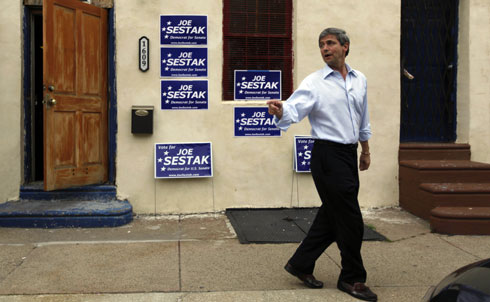
After unseating longtime-Republican-just-turned-Democratic incumbent Arlen Specter in a surprise win in the primaries, Joe Sestak is running on the Democratic ticket in Pennsylvania with decidedly anti-establishment sensibilities. This Senate race is being billed as the race of the insurgents—Tea Party candidate Pat Toomey versus lefty outlier Sestak—though Ari Berman argues that Sestak may not be a “full-throated progressive.” Case in point: Sestak has been an enthusiastic supporter of the Afghan war during his time serving in the House. Recent polls put Toomey slightly ahead of Sestak.
Credit: AP Images
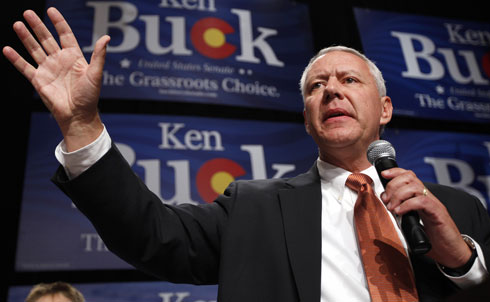
Democrat Michael Bennet, Colorado’s incumbent senator, has gotten a lot of support from Obama in this race, as well as a boost from New York City Mayor Michael Bloomberg. Bennet’s opponent, Ken Buck, is one of the most hard-line anti-immigrant candidates in this election season, and has even been personally involved in deportation raids. Buck also categorically opposes abortion, is against many forms of birth control, and made comments during the primaries suggesting he finds women less suited for political office than men. Frighteningly, the race is still a toss-up.
Having been appointed to fill a Senate vacancy in 2009, Bennet is new to campaigning, and he leaves many voters unconvinced about his ability to address economic woes.
Credit: Reuters Pictures
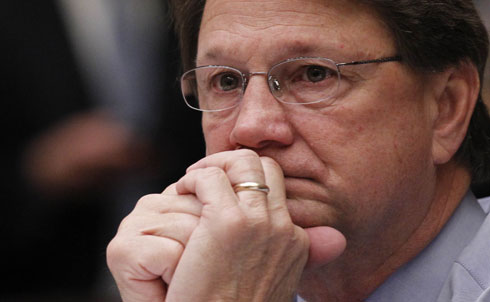
Democrat Charlie Melancon made a name for himself during his tenure as House Rep for Louisiana’s 3rd congressional district by opposing the Central American Free Trade Agreement in the name of protecting Louisiana’s workers. Since then he’s had a lot on his plate dealing with the aftermath of BP’s Gulf oil spill, and now he’s going after Republican Senator David Vitter’s seat.
Melancon is in touch with the life of the place he represents—The Nation’s Mark Hertsgaard recently described how Melancon “broke down weeping during a Congressional hearing while describing the devastation of its ecosystems, jobs and way of life.” Still, Melanon opposes a blanket moratorium on offshore drilling because of the jobs drilling creates.
Incumbent Vitter, on the other hand, is getting a big chunk of campaign funding from oil and gas companies—$445,200 worth—and he’s been criticized for trying to limit BP’s liability for the Gulf spill. The National Organization for Women went so far as to call on Congress to censure and expel Vitter—he kept on staff an aide who pled guilty to charges stemming from an altercation with an ex-girlfriend. Even so, Melancon is currently trailing Vitter by a significant margin in the polls.
Credit: AP Images
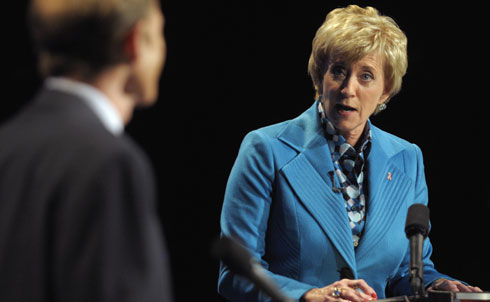
Richard Blumenthal, Connecticut’s Democratic candidate for Senate, is in hot water for inaccurately representing his record of military service. In contrast, it’s a mystery how former World Wrestling Entertainment CEO turned Republican candidate Linda McMahon has managed to keep her image relatively respectable, given the wild antics of her past.
McMahon walks a cautious line on a lot of the issues, and could be palatable to disillusioned centrist Democrats: She favors letting gay people serve in the military, she calls herself pro-choice but wants limited federal funding for abortions and remains on the fence on immigration reform.
McMahon is not, however, big on job creation, a central issue in recent debates. Her stance is “people create jobs, not governments.” And though she’s touting her business savvy in her campaign, it seems she’s more adept at cutting jobs than at creating them—Blumenthal recently called her out for laying off 10 percent of her staff while taking $10 million in state funds.
Credit: AP Images
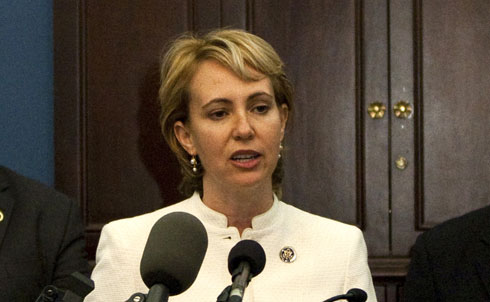
Gabrielle Gifford’s 2006 House win was an unexpected victory for progressives and a triumph for Arizona’s grassroots activists that worked to make it happen. But she faces stiff competition this year from staunch anti-immigration opponent Jesse Kelley, and finds herself in a tough race, particularly given her stance as a war critic.
She defeated an anti-immigrant candidate once before—her 2006 opponent had backing from the Minutemen—though it remains to be seen if she can pull it off this time, with a Republican poll putting the two candidates neck-and-neck.
A loss for Gifford would be bad news for the environment—she made important, pragmatic moves on sustainability this year with the Department of Defense Energy Security Act, as Christian Parenti noted in his July 15 article “The Big Green Buy.”
Credit: AP Images

In one of this season’s biggest primary upsets, anti-masturbation activist, Sarah Palin-lookalike and former witchcraft enthusiast turned Halloween hater Christine O’Donnell beat incumbent Republican Representative Mike Castle for the GOP’s nomination for Senate in Delaware. After a big push from her Tea Party base and seemingly decisive backing from Palin, O’Donnell’s win placed the extremely conservative candidate in the spotlight of a national debate about the viability of the Republican party’s rightward swerve. So far, says Leslie Savan, the Democrats have been delighted that O’Donnell, and not the popular, moderate Castle, will face Democratic senate nominee Chris Coons in November. A recent poll suggests that O’Donnell trails Coons by a significant margin, 53 to 36 percent.
Credit: AP Images

Minnesota Congresswoman Michele Bachmann provides a vivid example of how right-wing female politicians divide voters along gender lines. In her quite conservative district—where she has emerged as a national Tea Party darling, inveighing against "death panels" and urging Minnesotans to get "armed and dangerous" to "fight back" against cap-and-trade legislation—she has become increasingly dependent on male support.
Defending her seat from the Democratic Farm Labor Party’s Tarryl Clark (a female candidate who actually has a strong record on women’s issues), Bachmann’s support among women has steadily slipped: in polling before the 2008 contest Bachmann received support from 49 percent of men and 42 percent of women. In a recent poll, however, she got the support of 56 percent of men versus just 39 percent of women when pitted against Clark.
Credit: AP Images

In the race for Kentucky’s Senate seat, libertarian-leaning Republican Rand Paul’s campaign against the Democrats’ Jack Conway has seemingly scrambled the politics of both major parties. Conway says he would have voted for the Iraq War, while Paul says he would have voted against it; Conway supports the Patriot Act, while Paul has criticized it as an "overreach"; Conway crusades against marijuana, calling it a "gateway drug," while Paul has said that ten- and twenty-year sentences for possession are too harsh—a mildly countercultural stance that was only highlighted by a GQ article depicting the college-age Rand as a pot-smoking, girl-hazing, Christian-mocking devotee of the "Aqua Buddha." Worst of all, Conway says he would gladly extend the Bush tax cuts for the very rich for "five, eight, maybe ten" years—a position thoroughly in sync with Paul’s anti-tax crusade. Paul, who has overturned every imaginable convention of a populist Kentucky politician, is still leading the race, perhaps underscoring more the weakness of Conway’s watered-down conservative platform than the strength of Paul’s own policy positions.
Research for this slide show provided by Braden Goyette
Credit: AP Images


